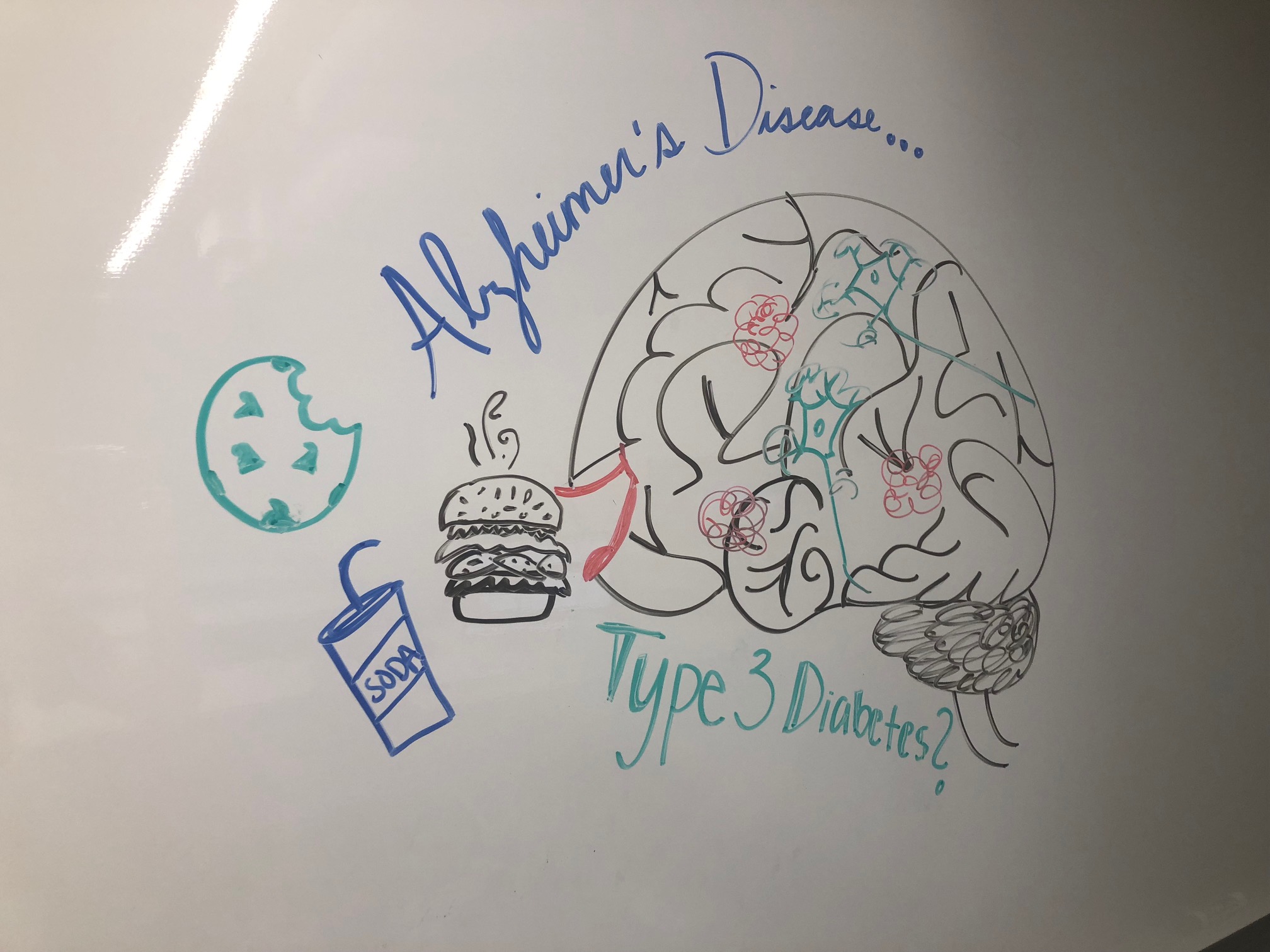In a society that values convenience, it should not come as a shock that 1 in 4 Americans eats fast food every day. Aside from poor eating habits, it has been found that nearly 70% of one’s waking hours are spent being sedentary, and yes that is referring to the copious amount of time you spend on the couch binge watching Netflix. Taking all of these factors into consideration, it is not surprising that nearly 40% of Americans are obese, not simply overweight, but obese. The more weight that an individual has, the greater the risk of their body becoming resistant to insulin, and developing type 2 diabetes. And if the threat of developing type 2 diabetes isn’t enough to consider changing your lifestyle, maybe learning that it nearly doubles your chances of developing Alzheimer’s Disease will.
It’s time to start spending less time in the McDonald’s drive thru, and more time thinking about your health.
How are Type 2 Diabetes and Alzheimer’s Disease related anyway? The Power of Insulin
Insulin is a hormone that is created in the pancreas that plays vital roles throughout the entire body. Not only does it maintain proper blood sugar levels, but it also assists the body in using and storing energy depending on its metabolic needs. Insulin is what turns your Big Mac into energy that your body can use.

Insulin Resistance: What happens when insulin can’t do it’s job?: The link between Type 2 Diabetes and Alzheimer’s Disease
So if type 2 diabetes (T2D) is defined by insulin resistance, how does that relate to Alzheimer’s Disease (AD)?
Insulin has a special role in the brain. It works to protect neurons, strengthen connections, and plays vital roles in cognition and memory. If insulin can’t function in the brain, these processes are disrupted.
(Memory loss and impaired cognition are two symptoms of Alzheimer’s Disease)
The brains of AD patients usually have two main “tell-tale” signs signifying that Alzheimer’s was present: amyloid-beta plaques and neurofibrillary tangles.

It is believed that insulin resistance in Alzheimer’s Disease may be the result of an accumulation of these amyloid beta plaques in the brain, and in supporting this theory, there are many additional hypotheses as to how this insulin resistance develops in the brain.
TNF-α and Inflammation
It is believed that prolonged inflammation is responsible for insulin resistance in both T2D and AD.
In Type 2 Diabetes: As mentioned above, being obese has been linked to the development of T2D. It’s simple: as fat cells accumulate, inflammatory molecules also accumulate, and one of the instigators of this inflammation is a pro-inflammatory cytokine known as TNF-α.
In Alzheimer’s Disease: Prolonged inflammation is often a defining characteristic in Alzheimer’s brains. This inflammation is often the result of immune cells in the brain known as microglia. These cells often release inflammatory molecules in response to the accumulation of the amyloid beta particles described earlier. Interestingly enough, research has shown that in order for these amyloid beta instigators to cause insulin resistance in AD patients, the TNF-α receptor must be present.
It’s a fairly reasonable conclusion that the inflammatory mechanisms of TNF-α may explain the prolonged inflammation causing inadequate insulin signaling in both AD and T2D.
And there you have it, a link between two unlikely partners in a toxic relationship.

Figure 1. This image depicts inflammation in the brain and periphery mediated by TNF-α and its relationship to AD and T2D.
Gangliosides and Insulin Resistance
Gangliosides have also been found to play an important role in insulin resistance.
Ganglioside GM3:
Insulin resistance mediated through TNF-α, as described above, is dependent on the accumulation of GM3.
- As GM3 accumulates in the cell membrane, it causes tension that pulls insulin receptors out of their normal location.
- It is believed that the accumulation of GM3 is the result of amyloid beta plaques interfering with proper ganglioside metabolism.
- When insulin receptors are no longer in the correct spot, they become unrecognizable to the molecules that play a role in insulin signaling.
- When proper signaling can no longer occur, insulin will not be able to perform its functions in the body, and insulin resistance will result.
Figure 2. This image displays the accumulation of GM3 rendering proper insulin signaling defective.
Ganglioside GM1:
The ganglioside GM1 is a binding site for amyloid beta oligomers (ABOs) and is thus responsible for the accumulation of ABOs into toxic amyloid beta plaques. Interestingly enough, research has found that diabetes increases the accumulation of these toxic plaques, and you have yet another link between the two diseases.

So what’s the point?

Stop taking the easy way out when it comes to your health, it could save your life.
- Take some time instead of the 2 minutes you spend in the drive thru, and make a meal!
- Here are a few recipes you can try that are SUPER simple, healthy, and relatively quick:
- “31 Healthy Dinner Recipes that take 30 Minutes or Less”
- visit: https://pin.it/4ejzhyj6ha7yae
- “31 Healthy Dinner Recipes that take 30 Minutes or Less”
- Here are a few recipes you can try that are SUPER simple, healthy, and relatively quick:
- Stop binge watching Game of Thrones on the couch!
- You could try watching it on your phone from the comfort of an elliptical or stair climber, trust me, it works!
- Take care of your body; you only get one, and I hate to break it to you, but health care professionals can’t cure every ailment.
- Just so you are aware: there are no known cures for Type 2 Diabetes or Alzheimer’s Disease.
https://www.ncbi.nlm.nih.gov/pmc/articles/PMC2996155/
https://www.mayoclinic.org/diseases-conditions/diabetes/symptoms-causes/syc-20371444
https://www.dosomething.org/us/facts/11-facts-about-american-eating-habits
https://www.askdoctork.com/how-does-alzheimers-wreak-so-much-havoc-in-the-brain201506258011
http://diabetes.diabetesjournals.org/content/63/7/2262https://www.healthnutnews.com/alzheimers-type-3-diabetes/
